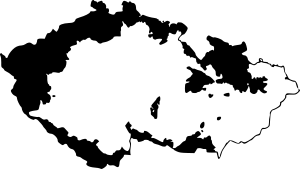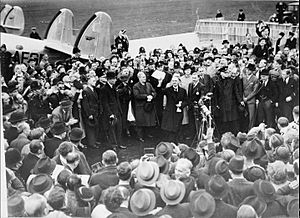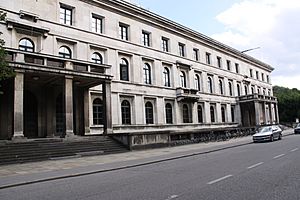Munich agreement facts for kids
The Munich Agreement was a special deal made in 1938. It involved four big countries: France, Italy, Nazi Germany, and Britain. This agreement happened after Germany, led by Adolf Hitler, took over a part of Czechoslovakia called the Sudetenland.
The leaders of Britain and France hoped to stop Hitler from using his army again. They offered him the land he had already taken in exchange for a promise of peace. Hitler agreed to this. Many people at first thought the agreement was a big success. However, Hitler broke his promise and invaded the rest of Czechoslovakia in 1939. This event helped start the Second World War.
Contents
Why the Agreement Happened

In 1938, Czechoslovakia was an independent country. It had been created in 1918 after the First World War. Adolf Hitler, the leader of Germany, wanted more "living space" (which he called Lebensraum). He wanted all German-speaking people to be part of Germany.
Most German-speaking people in Czechoslovakia lived in the Sudetenland. So, Hitler decided to take this area first. He also knew that Czechoslovakia would lose much of its factories and industries if the Sudetenland was taken. Britain, France, and the Soviet Union had all promised to help Czechoslovakia if it was attacked.
The Crisis Point

On September 12, 1938, Hitler told the German people in the Sudetenland that he would support them. Three days later, on September 15, British Prime Minister Neville Chamberlain met with Hitler. This was a last try to avoid a war. Hitler seemed to calm down his demands. He said he only wanted certain parts of Czechoslovakia. Chamberlain thought this was reasonable and that Hitler would be happy with just those areas.
However, on September 22, Hitler changed his mind. He now demanded the entire Sudetenland. Britain's navy got ready for war, and it looked like war was about to begin.
The Munich Conference
On September 29, 1938, Benito Mussolini, the leader of Italy, convinced Hitler to attend a peace meeting in Munich. The meeting included four leaders: Hitler for Germany, Mussolini for Italy, Chamberlain for Britain, and Édouard Daladier for France. Neither the Soviet Union nor Czechoslovakia were invited to this important meeting.
At the conference, Mussolini presented a plan. This plan was actually written by Germany. It said that the Sudetenland would become part of Germany right away. The German army would march into the Sudetenland the very next day and claim it. Britain and France agreed to this plan. Czechoslovakia was not even asked for its opinion, and the Soviet Union was very upset.
Chamberlain went back to Britain and was welcomed like a hero. He believed he had achieved "peace for our time" through his policy of appeasement (giving in to demands to avoid conflict).
After the Agreement
Edvard Beneš, the president of Czechoslovakia, resigned. He felt that Britain and France had betrayed their promises to help his country. On October 1, Germans marched into the Sudetenland. Hungary and Poland also took parts of Czechoslovakia where people of their nationality lived.
Images for kids
-
Konrad Henlein, leader of the Sudeten German Party (SdP), a branch of the Nazi Party of Germany in Czechoslovakia
-
Edvard Beneš, president of Czechoslovakia and leader of the Czechoslovak government-in-exile
-
Admiral Horthy during the Hungarians' triumphant entry into Košice, November 1938
-
Poland annexed the Zaolzie area of Czechoslovakia inhabited by 36% of ethnic Poles in 1938.
-
Adolf Hitler on his visit to Prague Castle after the establishment of a German protectorate, 15 March 1939
See also
 In Spanish: Acuerdos de Múnich para niños
In Spanish: Acuerdos de Múnich para niños
 | William L. Dawson |
 | W. E. B. Du Bois |
 | Harry Belafonte |
















